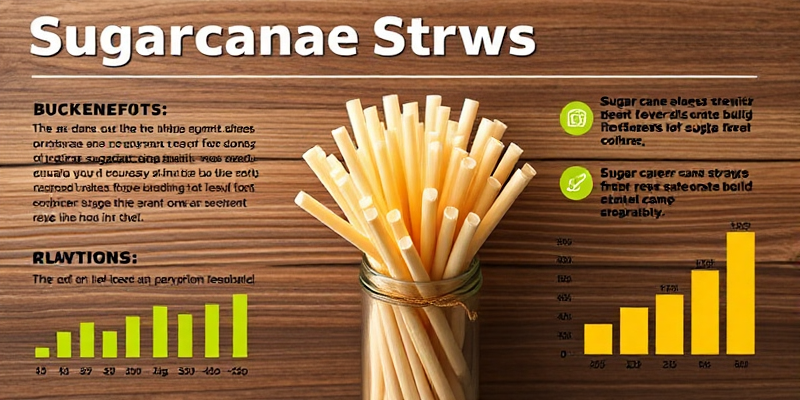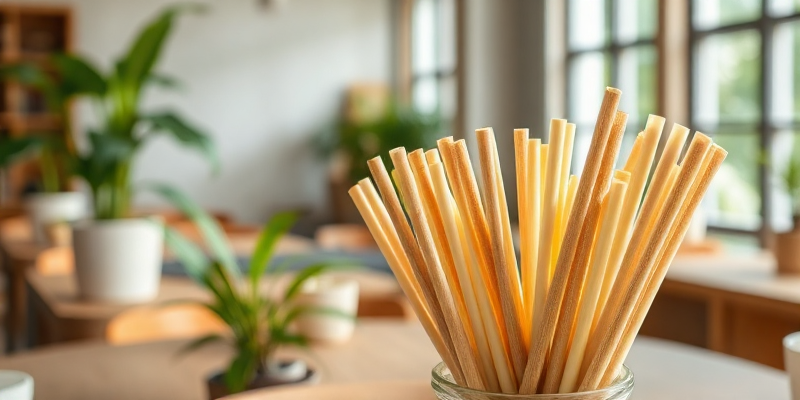Соломинка с сахарным тростником: B2B-совместимость, экономически эффективный & Устойчивый

Введение: переход от пластиковых на растительные растворы

Представьте себе: ваша сеть отелей только что получила уведомление о том, что одноразовые пластиковые соломинки будут запрещены в трех основных местах, где вы работаете, вступают в силу всего за 90 дней. Ваша команда закупок пытается, ваш сотрудник по устойчивому развитию вызывает заинтересованные звонки инвесторов, и ваш финансовый директор обеспокоен последним воздействием. Звучит знакомо?
Этот сценарий разыгрывает Acro The Hospitality, Food Service и розничная торговля по всему миру, поскольку пластиковые соломенные запреты подметают Acro более 32 стран и сотни городов. Примерно с 8,3 миллиардами пластиковых соломинок, загрязняющих только мировые пляжи, давление на предприятия на поиск устойчивых альтернатив никогда не было более интенсивным.
Задача заключается не в том, чтобы найти замену-это нахождение той, которая соответствует строгим требованиям к бизнесу: долговечность, сертификация безопасности пищевых продуктов, удовлетворенность клиентов, соответствие нормативным требованиям * и * затраты. Вот где соломинка с сахарным тростником входит на картинку.
Узнайте, почему соломки для сахарного тростника становятся предварительным решением для дальновидных предприятий стремясь сбалансировать устойчивость с практическими потребностями бизнеса. Сделано из Багасса - волокнистого побочного продукта, оставленного после извлечения сока из сахарного тростника - эти соломинки представляют собой настоящий раствор круговой экономики, который превращает сельскохозяйственные отходы в ценный продукт.
В отличие от многих альтернатив, которые просто заменяют одну экологическую проблему на другую, соломки сахарного тростника:
- 100% растительный и натуральный
- Домашний и промышленный компостируемый
- Без химикатов, пластмассы и добавок
- Способен выдерживать горячие напитки в течение 2+ часов
- Настраивается с возможностями брендинга
- FDA и LFGB, сертифицированные для глобальных стандартов безопасности пищевых продуктов
По мере того, как пластиковые запреты ускоряются по всему миру, соломинки из сахарного тростника быстро становятся предпочтительным выбором для предприятий, которые необходимо соответствовать нормативным требованиям при сохранении оперативной эффективности и удовлетворенности клиентов.
Соответствие нормативным требованиям: сертификаты, которые имеют значение для глобальных операций B2B

Для международных предприятий навигация на сложную сеть регулирующих соответствий ACROS различные рынки могут быть пугающими. Соломка из сахарного тростника предлагает значительное преимущество на этой арене.
Согласно обзору соответствия в 2023 году Greenbiz, предприятия сталкиваются со средним уровнем 41 000 долл. США в виде штрафов за нарушение одноразовых пластических правил на крупных европейских рынках-стоимость, которая может быстро умножить несколько мест или повторных нарушений.
Нормативный ландшафт для продуктов питания становится все более строгим:
### Сертификация безопасности пищевых продуктов
Соломинки из сахарного тростника от авторитетных поставщиков, таких как NatureBioeco, поставляются с Сертификация FDA, гарантируя, что они соответствуют строгим требованиям Управления по контролю за продуктами и лекарствами США к материалам для пищевых контактов. Эта сертификация имеет решающее значение для предприятий, работающих на рынке США или экспорта в него.
Аналогичным образом, сертификация LFGB (German Food, статьи ежедневного использования и кормового кода) обеспечивает гарантию европейского рынка, который имеет некоторые из самых строгих стандартов безопасности пищевых продуктов в мире.
### Экологическое соответствие
Узнайте, как соломинки из сахарного тростника помогают соответствовать нормативным требованиям Acros Global Markets При обеспечении перехода с плавами из пластика. Эти соломки соответствуют:
- Директива ЕС одноразовая пластмассы
- Различные национальные и местные пластиковые запреты по всему миру
- Стандарты компостируемости (EN 13432, ASTM D6400)
Для покупателей B2B этот комплексный пакет соответствия устраняет необходимость поиска различных решений для различных рынков, оптимизации закупок и обеспечения последовательного опыта работы с клиентами Acros Global Operations.
«Ранее нам приходилось поддерживать три различных соломенных запасов для наших европейских, североамериканских и азиатских объектов», - объясняет Сара Чен, директор по закупкам для глобальной сети отелей. «Переход на сертифицированную соломинку из сахарного тростника позволил нам стандартизировать Acro All Properties, выполняя каждое региональное регулирование».
Как соломинка с сахарным тростником по сравнению с другими альтернативами эко

При оценке устойчивых вариантов соломы менеджеры по закупкам часто сталкиваются с заметным выбором. Давайте сравним основные альтернативы на основе ключевых соображений B2B:
| Критерии | Сахарный тростник (багасс) соломинки | Бумажные трубочки | PLA «компостируемый» пластик | Многоразовый металл/GLA |
|---|---|---|---|---|
| ——-- | ———————— | ———- | ———————— | ——————-- |
| Долговечность в напитках | 2+ часа в горячих/холодных жидкостях | 30-60 минут до смягчения | Хорошо до тех пор, пока тепло воздействие | Отличный |
| Компостируемость | Домашний и промышленный компостируемый | Промышленная компостируемая | Только промышленные объекты | Не компостируется |
| Качество обслуживания клиентов | Естественный ощущение, без переноса вкуса | Может повлиять на вкус напитка | Похоже на пластик | Требуется стирка |
| Воздействие на окружающую среду | Сельскохозяйственный побочный продукт, углеродный отрицательный | Ресурсоемкий производство | Сделано из кукурузы, часто ГМО | Высокая производственная площадь |
| Стоимость за единицу (объем) | $ 0,02-0,04 | $ 0,01-0,03 | $ 0,03-0,05 | $ 0,50-2,00 |
| Обслуживание | Нет (одноразовый) | Нет (одноразовый) | Нет (одноразовый) | Требуется мыть/дезинфицировать |
| Потенциал брендинга | Настраиваемый | Печатная | Ограничен | Варианты гравюры |
Изучите, почему соломинки из сахарного тростника обеспечивают превосходную ценность для применения B2B по сравнению с другими альтернативами. Согласно исследованию потребительских предпочтений в 2023 году, проведенными устойчивыми брендами, 72% клиентов предпочитали ощущение и производительность соломы сахарного тростника, а не бумажные альтернативы, когда слепые испытывали в ресторан.
В то время как бумажные соломинки могут изначально выглядеть дорогими, их более высокий уровень замены (из -за более быстрого ухудшения в напитках) и более низких результатов удовлетворенности клиентов часто приводят к более высокой истинной затратах. Отель, который переключился с бумаги на сахарный тростник, сообщил о сокращении общих затрат на солонку на 15% из -за меньшего количества замены и отходов.
Верхние Busines Преимущества перехода на соломинки сахарного тростника

Помимо соответствия, соломинка с сахарным тростником предлагает убедительные преимущества в бизнесе, которые непосредственно влияют на эффективность эксплуатации и удовлетворенность клиентов.
### Улучшение бренда и восприятие клиентов
Узнайте, как соломинки с сахарным тростником на заказ могут повысить ваш образ устойчивости и создать незабываемый опыт работы с клиентами. Исследования из Центра устойчивых бизнесов Нью -Йоркского университета Стерна показывают, что продукты, продаваемые как устойчивые рост в 5,6 раза быстрее, чем те, которые не являются.
Соломка из сахарного тростника предлагает существенные возможности для брендинга-от пользовательской печати до цветовых вариантов-которые позволяют предприятиям превратить необходимый предмет в инструмент для укрепления бренда.
### Стабильность стоимости и безопасность цепочки поставок
В отличие от продуктов на основе нефти с ценами, привязанными к рынкам летучих нефти, соломинка с сахарным тростником предлагает более предсказуемые цены. Их производство от сельскохозяйственных побочных продуктов обеспечивает изоляцию от колебаний цен, которые влияют на пластические альтернативы.
Кроме того, диверсификация цепочек поставок от пластика снижает воздействие все более распространенных сбоев в нефтехимической промышленности.
### Снижение затрат на управление отходами
Для объектов, которые компостируют пищевые отходы, соломинки из сахарного тростника могут быть утилизированы в том же потоке, что потенциально снижает затраты на перевозку отходов. Цепочка гостиничной сети среднего размера сообщила о снижении расходов на управление отходами на 23% после перехода на полностью компостируемые предметы обслуживания, включая соломку для сахарного тростника.
### Удовлетворенность клиентов и лояльность
Современные потребители все чаще учитывают устойчивость в своих решениях о покупке. Исследование Deloitte 2023 года показало, что 45% потребителей изменили свои привычки потребления из -за проблем с устойчивостью, причем этот процент увеличился до 62% среди миллениалов.
Наглядно демонстрируя экологическую приверженность с помощью таких предметов, как соломка сахарного тростника, предприятия могут установить более прочные связи с этим растущим сегментом сознательных потребителей.
Воздействие на окружающую среду: почему выигрывают соломинку сахарного тростника

Экологические полномочия соломки из сахарного тростника выходят далеко за рамки просто «не пластика».
Откройте для себя полные экологические преимущества включения соломинки из сахарного тростника в стратегию устойчивостиПолем В соответствии с оценкой жизненного цикла Программная средаПродукты на основе сахарного тростника могут сократить выбросы парниковых газов на 85% по сравнению с их пластиковыми аналогами.
Экологические преимущества включают:
- ** секвестрация углерода **: сахарный тростник является одним из наиболее эффективных растений при захвате CO2 во время роста
- ** Сокращение отходов **: Использование сельскохозяйственных побочных продуктов, которые в противном случае были бы сожжены
- ** Сохранение воды **: требует значительно LES Water, чем производство бумаги
- ** Преимущества в конце жизни **: Полностью биоразлагаем в средах компостирования дома в течение 90 дней
Для предприятий, отслеживающих свои выбросы с масштабами 3 или работая над научно обоснованными климатическими целями, переход на соломинки сахарного тростника может способствовать значимому сокращению их углеродного следа. Исследование 2023 года, проведенное партнерами по влиянию климата, показало, что сеть ресторанов среднего размера может сократить свои выбросы углерода, связанные с упаковкой, на 37 метрических тонн в год, переключаясь с пластиковой на сахарный тростник.
Тематическое исследование: соломинка с сахарным тростником успешна в действии

### Global Hotel Chain Transfors Experience Experience
Роскошная отель -группа с 178 объектами недвижимости по всему миру внедренных соломинок из сахарного тростника в рамках более широкой инициативы по устойчивому развитию в 2022 году. Результаты через 12 месяцев были убедительными:
- 94% положительный отзыв для гостей о качестве соломы и долговечности
- 2,8 миллиона меньше пластиковых соломинков ежегодно входят в поток отходов
- $ 87 000 в виде пластикового запрета на штрафы Acros European Properties
- Показаны в 14 туристических публикациях для их лидерства в области устойчивого развития
- На 12% увеличение бронирования конференций от экологически сознательных корпоративных клиентов
Директор по закупкам отметил: «Больше всего удивило нас то, как такие, казалось бы, небольшие изменения - перехватывание соломы сахарного тростника - создали такой огромный положительный отклик от наших гостей. Мы получили более позитивные комментарии по этой инициативе, чем о наших более дорогостоящих инвестициях в устойчивость».
Фирменная соломинка с логотипом отеля тонко тиснены на каждой обертке, превратила утилитарный предмет в разговорную часть, которая усилила приверженность бренда устойчивому развитию.
Часто задаваемые вопросы
- Какое минимальное количество заказа для соломы для сахарного тростника?
- Большинство поставщиков B2B предлагают минимальные заказы, начиная с 10 000-25 000 единиц. В NatureBioeco мы понимаем различные потребности в бизнесе и предлагаем гибкие MOQ, начиная с 5000 для стандартных соломинков и 10 000 для пользовательских вариантов.
- Как долго продержится соломинка из сахарного тростника в хранении?
- При хранении в прохладном, сухом месте соломки для сахарного тростника поддерживают свое качество до 24 месяцев. В отличие от некоторых альтернатив, они не ухудшаются и не теряют структурную целостность во время надлежащего хранения.
- Можно ли настроить соломинку с сахарным тростником с нашим брендом?
- Абсолютно! Соломинка из сахарного тростника предлагает отличные варианты настройки, в том числе тисненные логотипы, пользовательские цвета и брендовые бумажные обертки. Эти настройки обычно требуют 2-3 недель дополнительного времени выполнения для производства.
- Соломинка из сахарного тростника дороже, чем пластиковая соломинка?
- Хотя стоимость единицы обычно на 15-30% выше, чем обычная пластиковая соломинка, общее внимание затрат должно включать избегание потенциальных штрафов, улучшение восприятия клиентов и согласование с целями устойчивости. Многие предприятия считают, что небольшая премия стоит того, что стоит.
- Работают ли соломинка из сахарного тростника с горячими напитками?
- Да, качественная соломинка из сахарного тростника поддерживает свою структурную целостность в горячих напитках в течение более 2 часов-значительно превосходя альтернативы бумаги, которые начинают разрушаться через 30-60 минут.
- Какие сертификаты я должен искать при поиске соломинки сахарного тростника?
- Для глобальных приложений B2B ищите сертификацию FDA (US), сертификацию LFGB (EU) и сертификаты компостиции (EN 13432, ASTM D6400). Они обеспечивают как безопасность, так и экологическое соответствие основными рынками.
- Каково типичное время заказа по заказу соломы с сахарным тростником?
- Стандартные заказы, как правило, поставляются в течение 7-10 Busines Days. Пользовательские заказы требуют 3-4 недели. Для предприятий с регулярными текущими потребностями мы рекомендуем создать запланированную программу доставки для обеспечения последовательной поставок.







